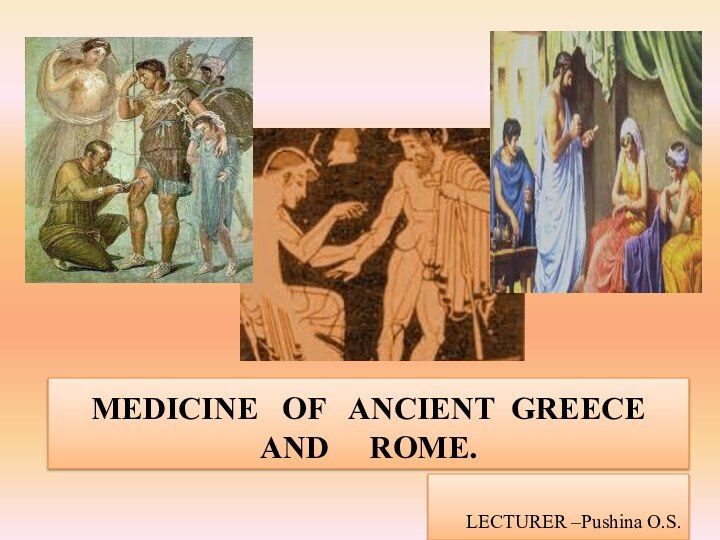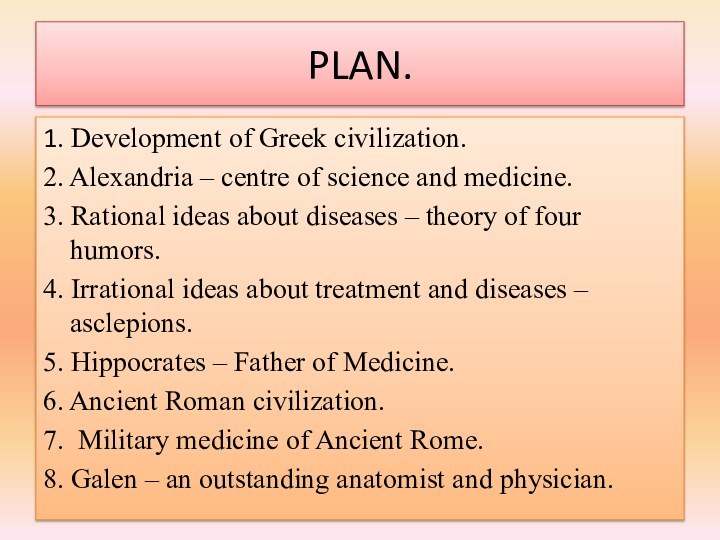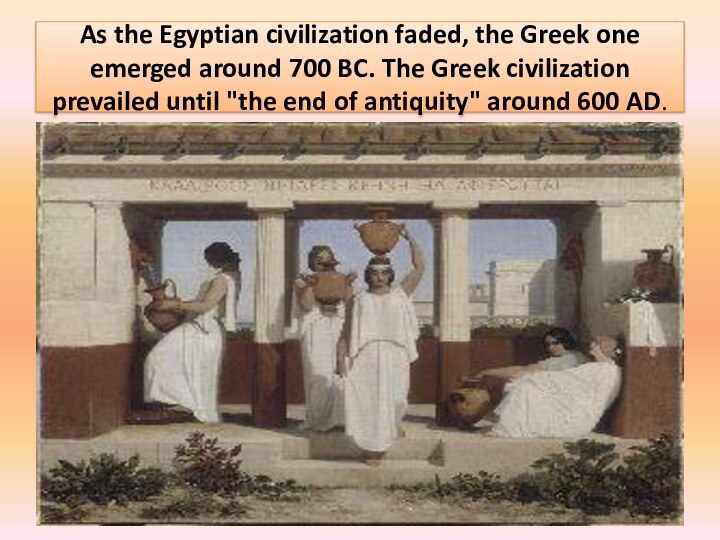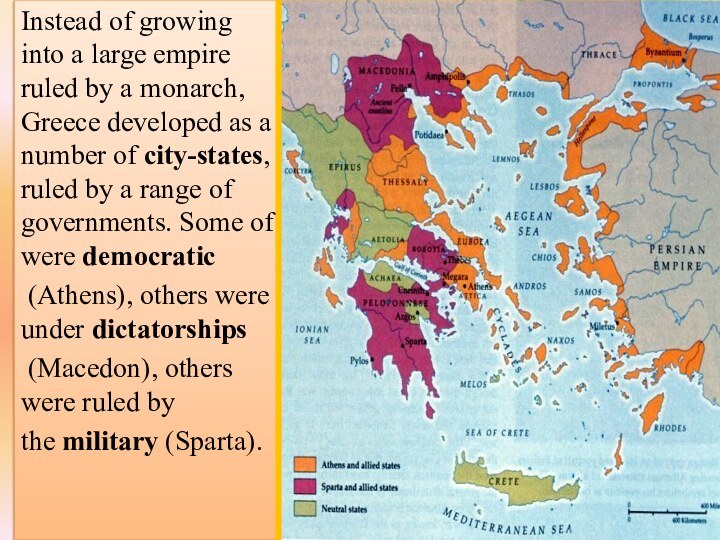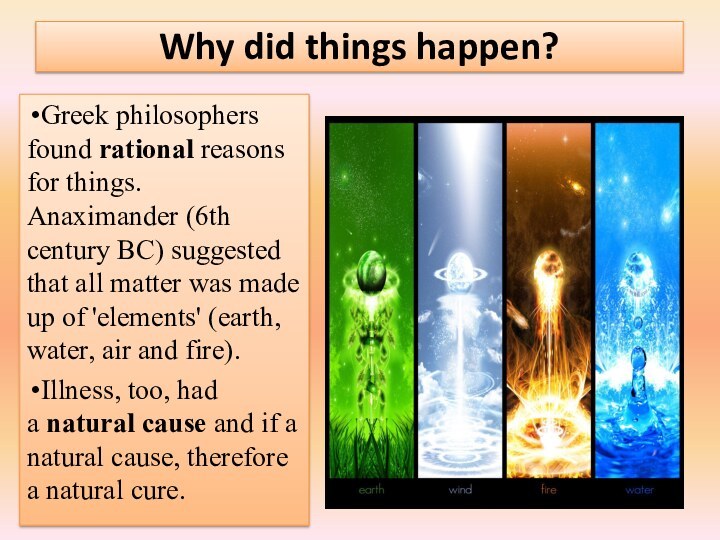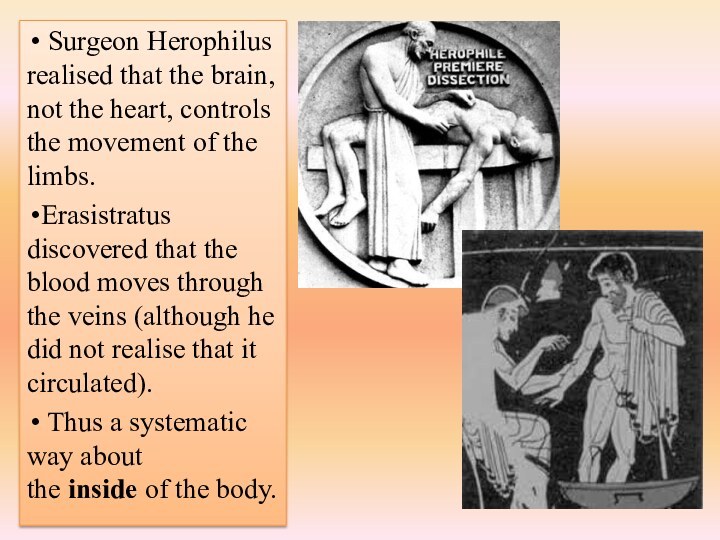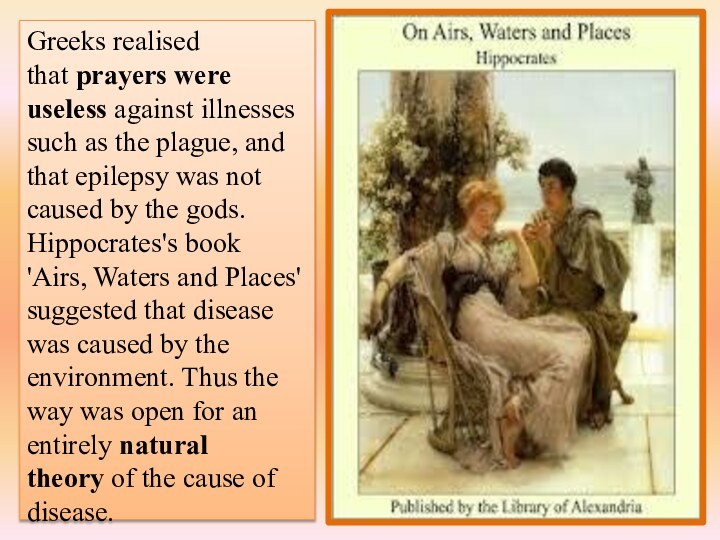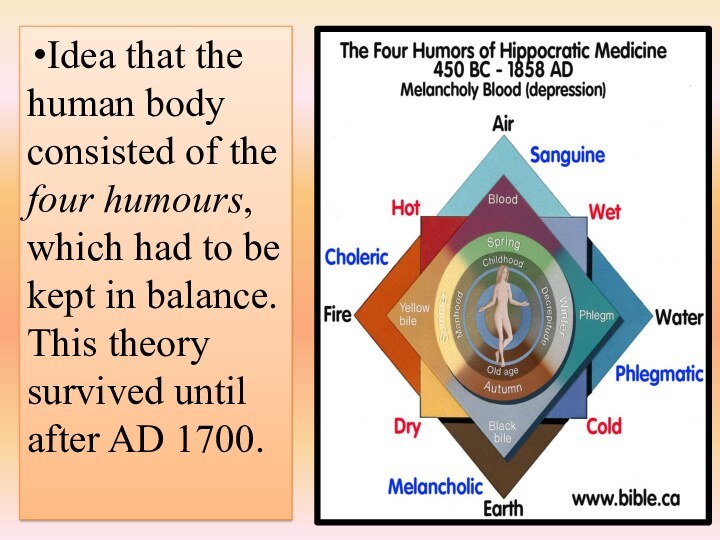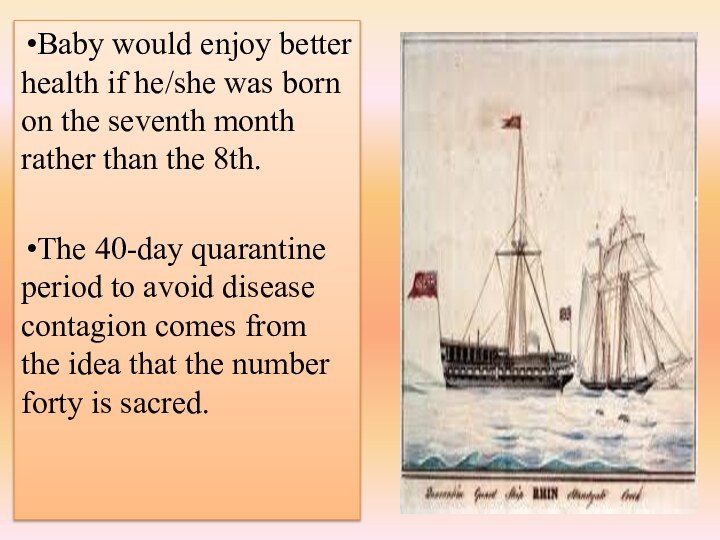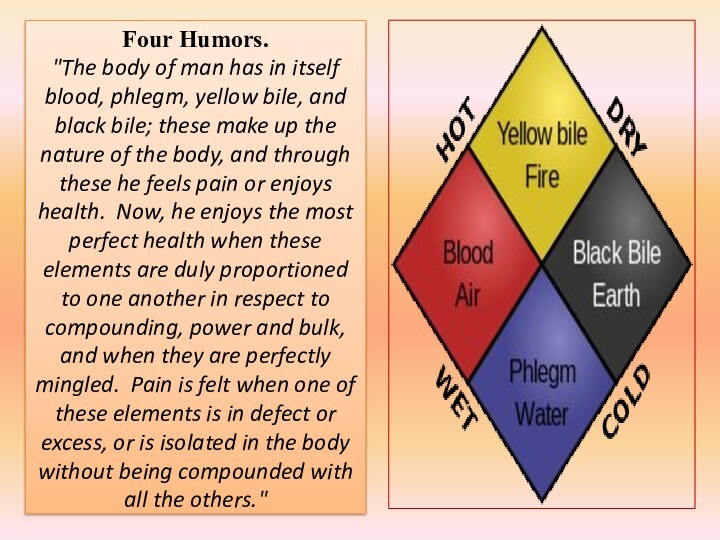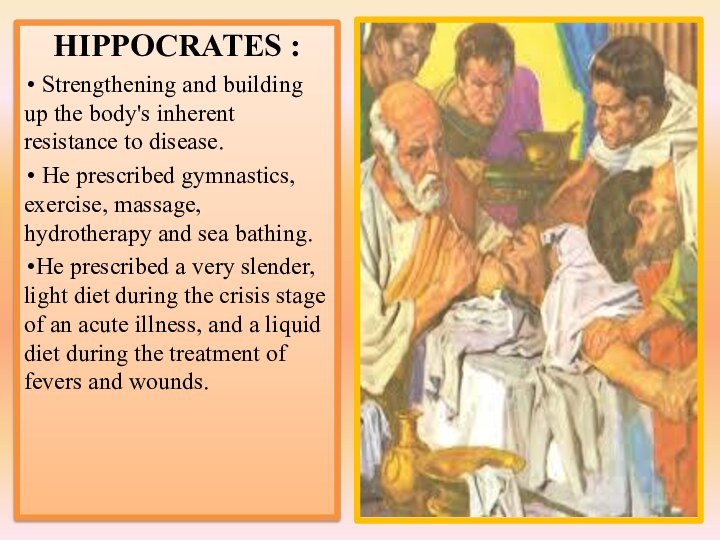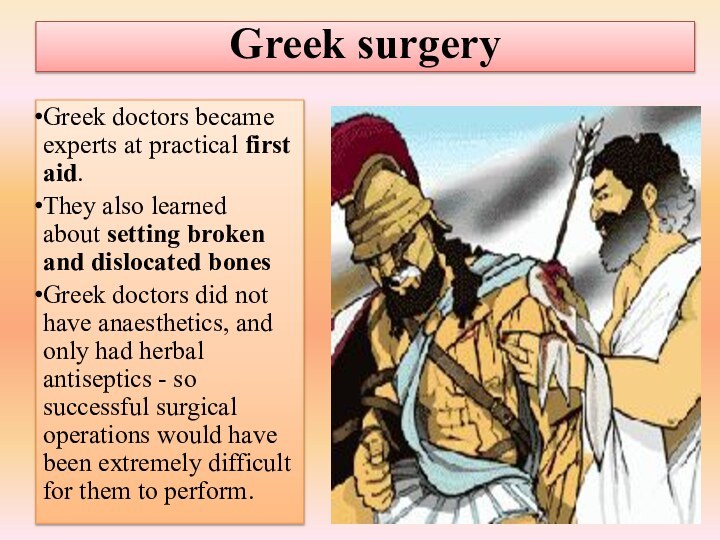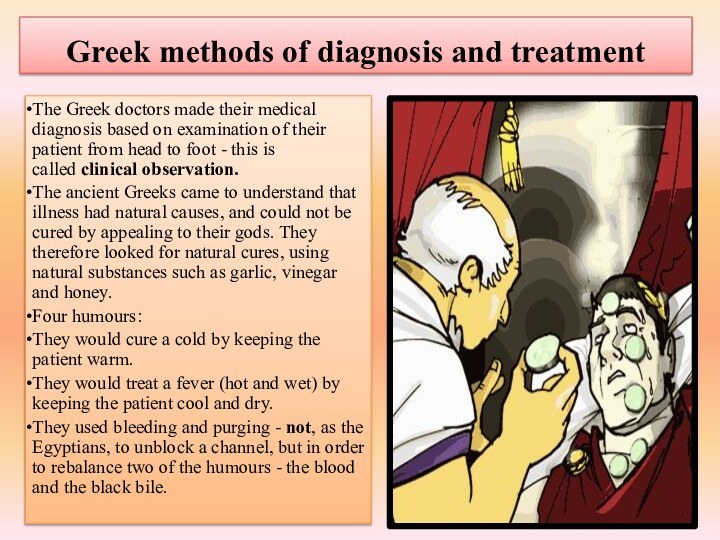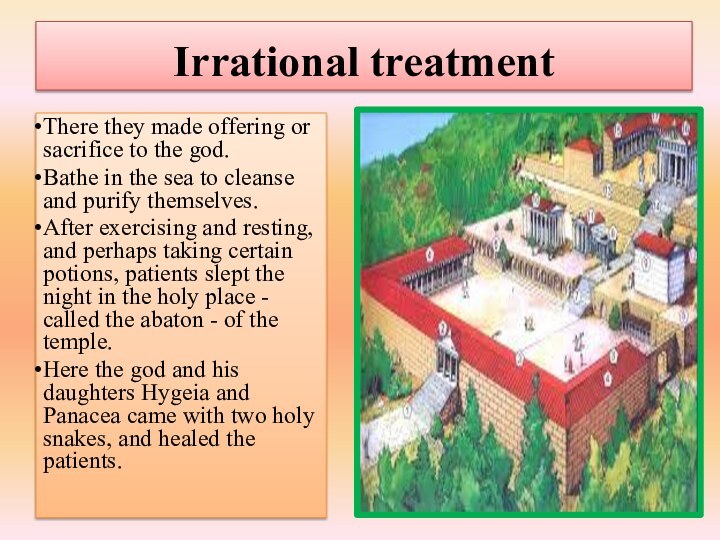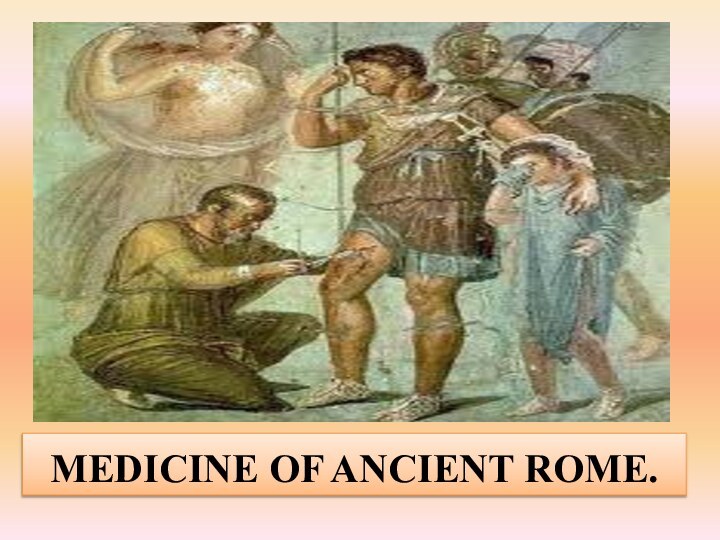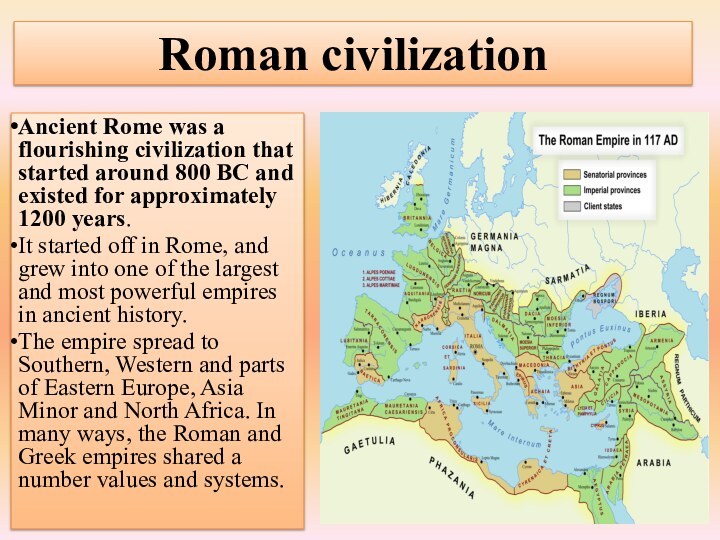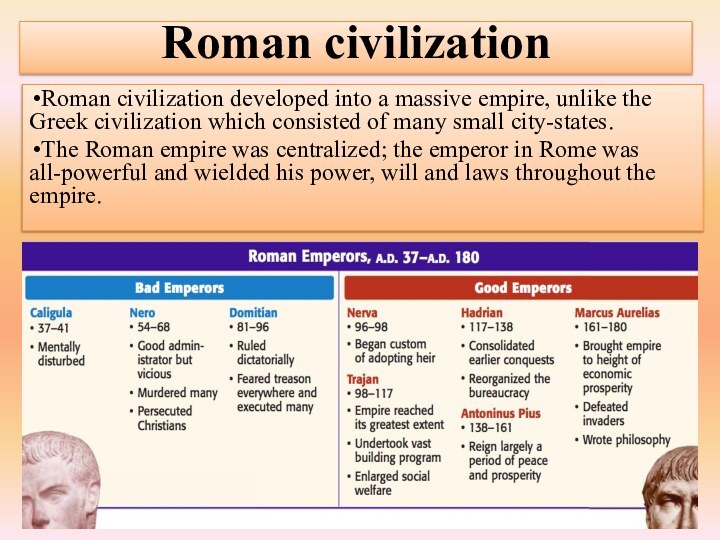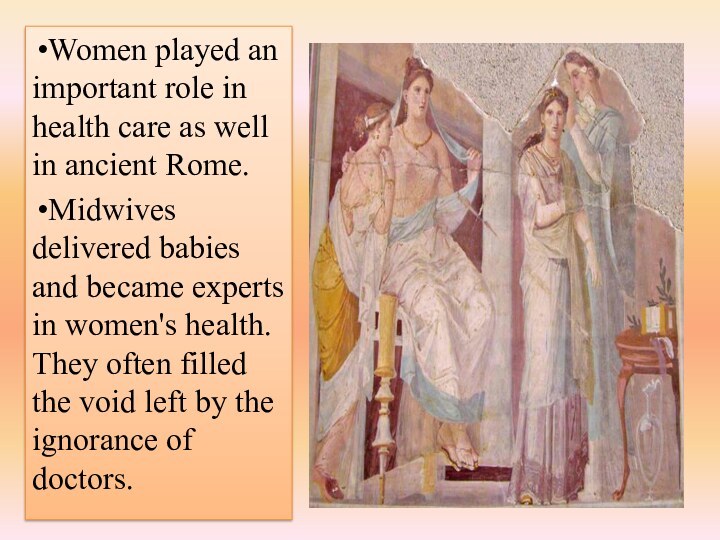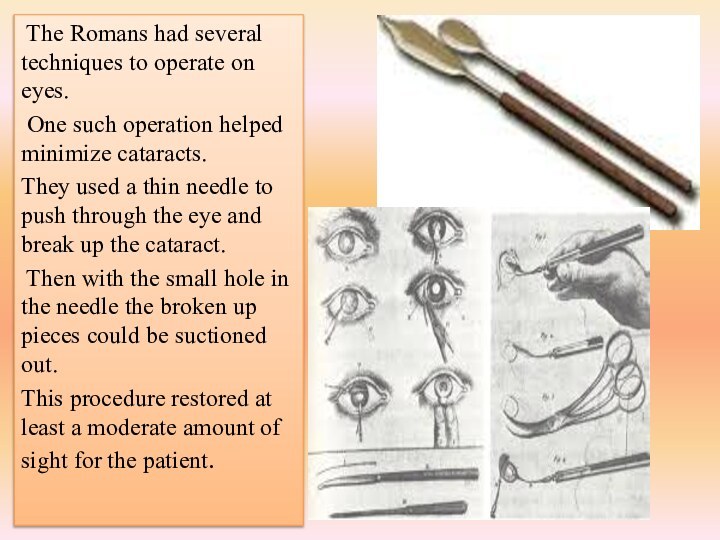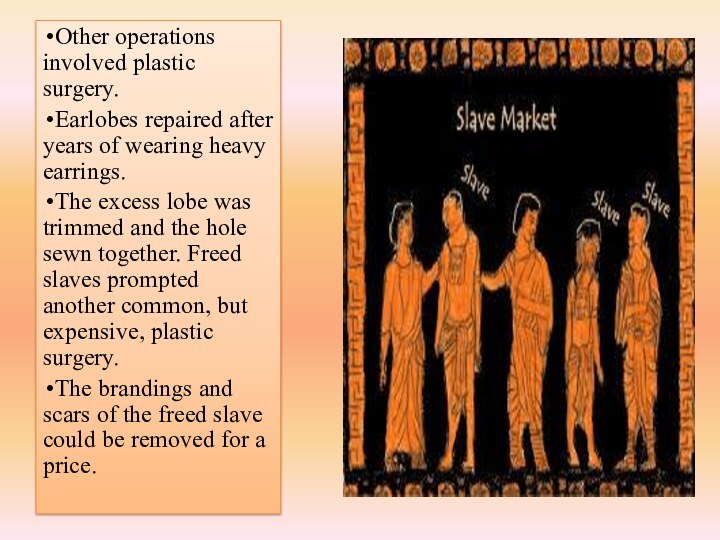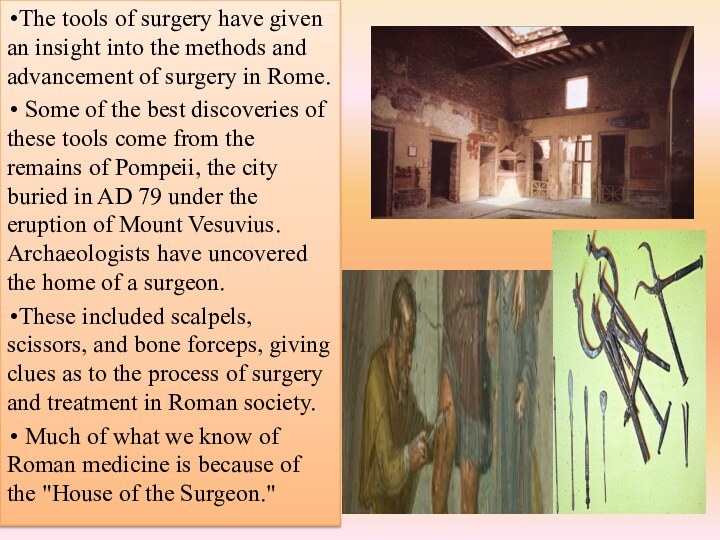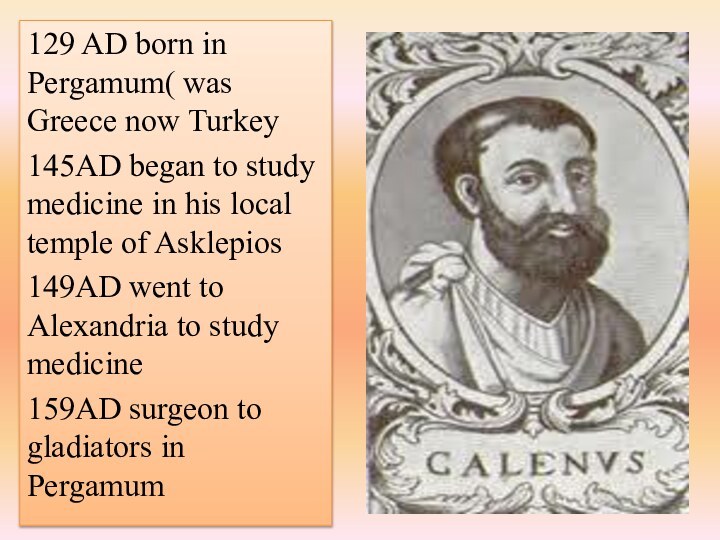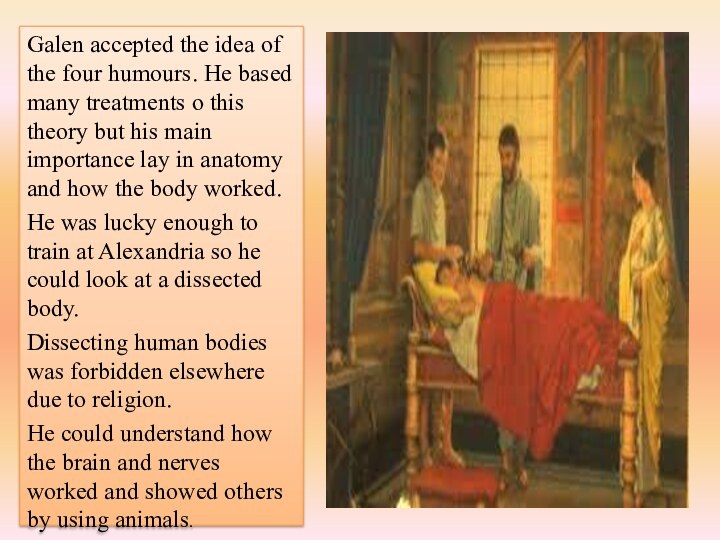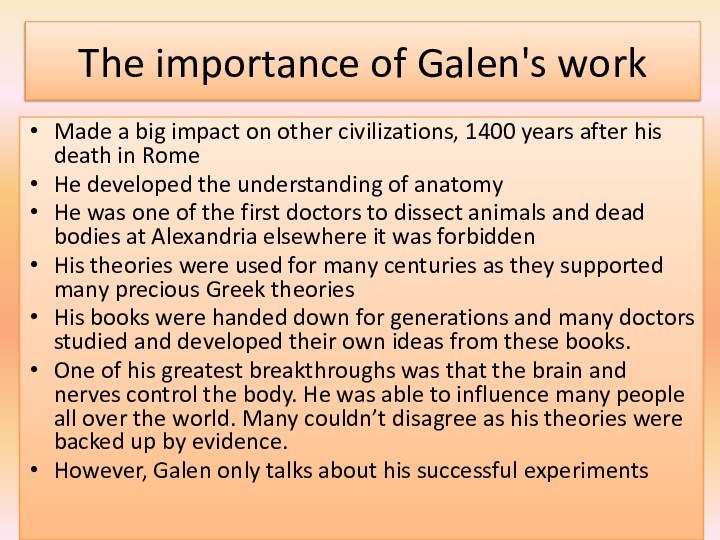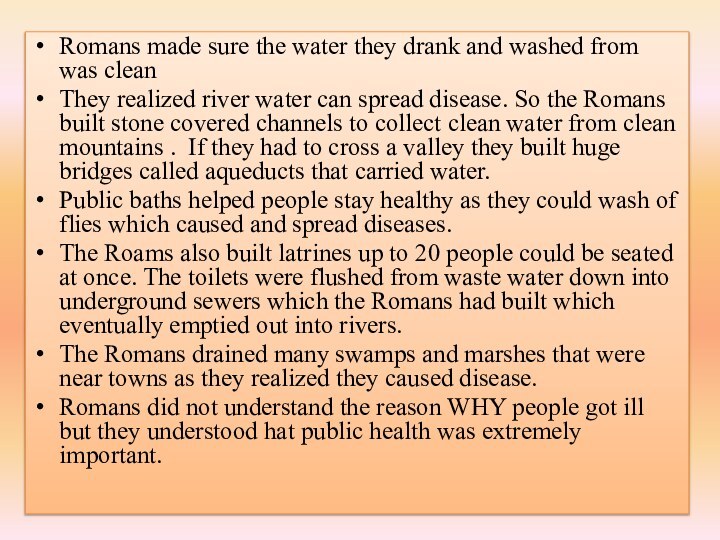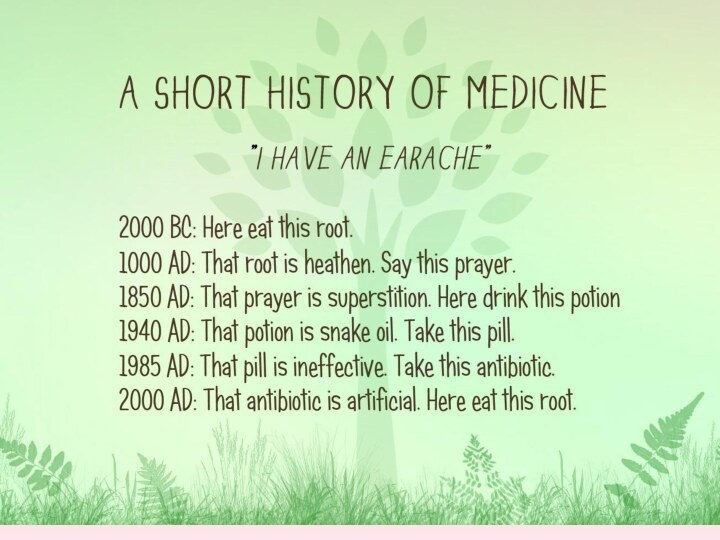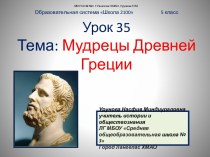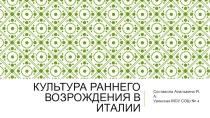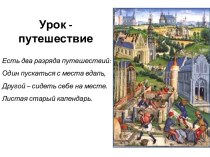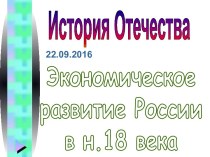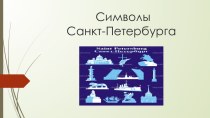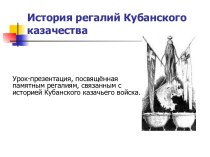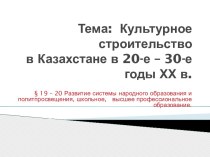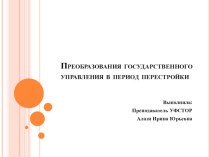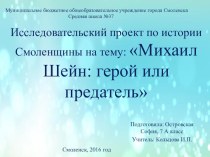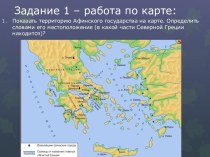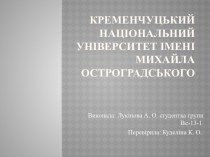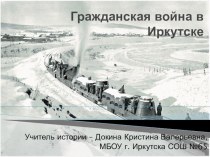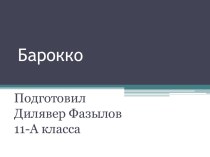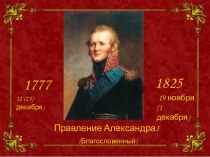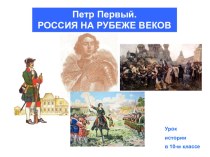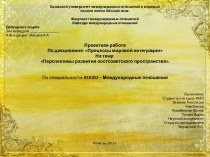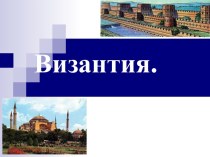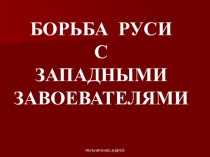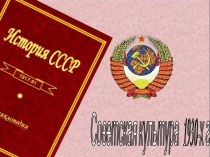Слайд 2
PLAN.
1. Development of Greek civilization.
2. Alexandria – centre
of science and medicine.
3. Rational ideas about diseases –
theory of four humors.
4. Irrational ideas about treatment and diseases – asclepions.
5. Hippocrates – Father of Medicine.
6. Ancient Roman civilization.
7. Military medicine of Ancient Rome.
8. Galen – an outstanding anatomist and physician.
Слайд 3
As the Egyptian civilization faded, the Greek one
emerged around 700 BC. The Greek civilization prevailed until
"the end of antiquity" around 600 AD.
Слайд 4
Instead of growing into a large empire ruled
by a monarch, Greece developed as a number of city-states,
ruled by a range of governments. Some of were democratic
(Athens), others were under dictatorships
(Macedon), others were ruled by
the military (Sparta).
Слайд 5
The Greek states built up a wide trading
empire. Greek cities became immensely wealthy.
Cultural life - drama, comedy,
sculpture, architecture, poetry, politics and public debates.
Phonetic form of writing - more flexible than Egyptian hieroglyphs.
Слайд 6
The Greeks developed the use of logic in discussion, and
Aristotle used these ideas to advance Greek understanding of
mathematics. The teacher Socrates developed a new method of education, which involved asking questions.
Слайд 7
Why did things happen?
Greek philosophers found rational reasons for things.
Anaximander (6th century BC) suggested that all
matter was made up of 'elements' (earth, water, air and fire).
Illness, too, had a natural cause and if a natural cause, therefore a natural cure.
Слайд 8
After 300BC Alexander the Great conquered a huge
empire, and Greek civilization and ideas spread all over
the Middle East.
Слайд 9
The city built by Alexander in Egypt, Alexandria,
became a centre for study and learning, and was
famous for its library.
Слайд 10
After philosophers such as Aristotle and Plato decided
that the human body was not needed in the
afterlife, Greek doctors at Alexandria in Egypt began to dissect bodies. Some even dissected the bodies of criminals who were still alive (vivisection).
Слайд 11
Surgeon Herophilus realised that the brain, not
the heart, controls the movement of the limbs.
Erasistratus discovered
that the blood moves through the veins (although he did not realise that it circulated).
Thus a systematic way about the inside of the body.
Слайд 12
Greeks realised that prayers were useless against illnesses such as
the plague, and that epilepsy was not caused by
the gods. Hippocrates's book 'Airs, Waters and Places' suggested that disease was caused by the environment. Thus the way was open for an entirely natural theory of the cause of disease.
Слайд 13
Idea that the human body consisted of the
four humours, which had to be kept in balance.
This theory survived until after AD 1700.
Слайд 14
This gave Greek doctors their idea Pythagoras came
up with the idea of the balance of opposites of
the underlying cause of disease.
Слайд 15
Followers of Pythagoras, Pythagoreans, believed that numbers had
precise meanings, especially the numbers 4 and 7.
and that
7x4 is the duration of the lunar month as well as the menstrual cycle (28 days),
7x40 is 280 which is how long a pregnancy is when it reaches full term.
Слайд 16
Baby would enjoy better health if he/she was
born on the seventh month rather than the 8th.
The
40-day quarantine period to avoid disease contagion comes from the idea that the number forty is sacred.
Слайд 17
Hippocrates
The most famous, and probably the most important
medical figure in Ancient Greece was Hippocrates, who is
known today as "The Father of Medicine".
Слайд 18
Hippocrates
Hippocrates collected data and conducted experiments to show
that disease was a natural process;
that the signs
and symptoms of a disease were caused by the natural reactions of the body to the disease process;
that the chief role of the physician was to aid the natural resistance of the body to overcome the metabolic imbalance and restore health and harmony to the organism.
Слайд 19
Four Humors.
"The body of man has in itself
blood, phlegm, yellow bile, and black bile; these make
up the nature of the body, and through these he feels pain or enjoys health. Now, he enjoys the most perfect health when these elements are duly proportioned to one another in respect to compounding, power and bulk, and when they are perfectly mingled. Pain is felt when one of these elements is in defect or excess, or is isolated in the body without being compounded with all the others."
Слайд 20
Hippocrates saw pepsis, or an orderly, balanced, harmonious digestion and
metabolism of the Four Humors as being essential to
all good health. In disorders of pepsis Hippocrates saw the origin of most disease.
Слайд 21
Hippocrates' anatomical knowledge was poor, but compensated by
knowledge of physiology and the soundness of his reasoning.
His surgical techniques for dislocations of the hip and jaw were unsurpassed until the 19 century.
Слайд 22
HIPPOCRATES :
Strengthening and building up the body's
inherent resistance to disease.
He prescribed gymnastics, exercise, massage,
hydrotherapy and sea bathing.
He prescribed a very slender, light diet during the crisis stage of an acute illness, and a liquid diet during the treatment of fevers and wounds.
Слайд 23
A CODE OF CONDUCT
One of the most significant
achievements – idea that doctors should follow a set
of rules of behaviour. Hippocrates set out a Hippocratic Oath for doctors that outlined the way they should behave.
Слайд 24
Greek surgery
Greek doctors became experts at practical first
aid.
They also learned about setting broken and dislocated bones
Greek doctors
did not have anaesthetics, and only had herbal antiseptics - so successful surgical operations would have been extremely difficult for them to perform.
Слайд 25
Greek methods of diagnosis and treatment
The Greek doctors
made their medical diagnosis based on examination of their
patient from head to foot - this is called clinical observation.
The ancient Greeks came to understand that illness had natural causes, and could not be cured by appealing to their gods. They therefore looked for natural cures, using natural substances such as garlic, vinegar and honey.
Four humours:
They would cure a cold by keeping the patient warm.
They would treat a fever (hot and wet) by keeping the patient cool and dry.
They used bleeding and purging - not, as the Egyptians, to unblock a channel, but in order to rebalance two of the humours - the blood and the black bile.
Слайд 26
Irrational treatment
When their doctors could not heal them,
many Greeks still appealed to their gods. Asklepios was
the Greek god of healing.
The temples built for his worship were used for treating the sick - called an asklepion
Слайд 27
Irrational treatment
There they made offering or sacrifice to
the god.
Bathe in the sea to cleanse and purify
themselves.
After exercising and resting, and perhaps taking certain potions, patients slept the night in the holy place - called the abaton - of the temple.
Here the god and his daughters Hygeia and Panacea came with two holy snakes, and healed the patients.
Слайд 28
Irrational treatment
The snake is still the symbol of
chemists, and words hygiene and panacea have become a part of our language.
Слайд 30
Roman civilization
Ancient Rome was a flourishing civilization that
started around 800 BC and existed for approximately 1200
years.
It started off in Rome, and grew into one of the largest and most powerful empires in ancient history.
The empire spread to Southern, Western and parts of Eastern Europe, Asia Minor and North Africa. In many ways, the Roman and Greek empires shared a number values and systems.
Слайд 31
Roman civilization
Roman civilization developed into a massive empire,
unlike the Greek civilization which consisted of many small
city-states.
The Roman empire was centralized; the emperor in Rome was all-powerful and wielded his power, will and laws throughout the empire.
Слайд 32
Roman civilization
Roman wealth went more into practical projects
and less into culture and philosophy.
The Romans built
aqueducts to pipe water to cites, sewers in their capital city, and public baths everywhere.
Слайд 33
Medicine in the Early Rome
In the early years
there were very few doctors in Rome.
The head of
each household was supposed to treat others people.
Specialized medical knowledge was associated with the Greeks.
Greeks were often slaves or ex-slaves and were not well thought of.
Слайд 34
The doctors in Ancient Rome did not receive
the respect given to doctors today.
In fact, most
Romans viewed doctors as cheats and charlatans.
The magical tricks and lack of truly effective treatments led to this reputation.
Слайд 35
With the many wars the Roman Empire conducted,
military medicine advanced the field.
Military doctors discovered new
techniques for treatment and adopted those of the areas they fought against.
Hospitals also developed as a result of military influence (called valetudinaria).
Civilian doctors worked out of the home or in storefronts.
Слайд 36
Women played an important role in health care
as well in ancient Rome.
Midwives delivered babies and
became experts in women's health. They often filled the void left by the ignorance of doctors.
Слайд 37
The Romans had several techniques to operate
on eyes.
One such operation helped minimize cataracts.
They
used a thin needle to push through the eye and break up the cataract.
Then with the small hole in the needle the broken up pieces could be suctioned out.
This procedure restored at least a moderate amount of sight for the patient.
Слайд 38
Other operations involved plastic surgery.
Earlobes repaired after
years of wearing heavy earrings.
The excess lobe was
trimmed and the hole sewn together. Freed slaves prompted another common, but expensive, plastic surgery.
The brandings and scars of the freed slave could be removed for a price.
Слайд 39
The tools of surgery have given an insight
into the methods and advancement of surgery in Rome.
Some of the best discoveries of these tools come from the remains of Pompeii, the city buried in AD 79 under the eruption of Mount Vesuvius. Archaeologists have uncovered the home of a surgeon.
These included scalpels, scissors, and bone forceps, giving clues as to the process of surgery and treatment in Roman society.
Much of what we know of Roman medicine is because of the "House of the Surgeon."
Слайд 40
129 AD born in Pergamum( was Greece now
Turkey
145AD began to study medicine in his local temple
of Asklepios
149AD went to Alexandria to study medicine
159AD surgeon to gladiators in Pergamum
Слайд 41
162 AD went to Rome. Physician to the
court of Emperor Marco Aurelius
166-7AD returned to work
in Pergamum
199 AD died in Rome after 30 years as Rome's leading doctor . By that time he had written over 400 books of which about 100 were known
Слайд 42
Galen accepted the idea of the four humours.
He based many treatments o this theory but his
main importance lay in anatomy and how the body worked.
He was lucky enough to train at Alexandria so he could look at a dissected body.
Dissecting human bodies was forbidden elsewhere due to religion.
He could understand how the brain and nerves worked and showed others by using animals.
Слайд 43
The importance of Galen's work
Made a big
impact on other civilizations, 1400 years after his death
in Rome
He developed the understanding of anatomy
He was one of the first doctors to dissect animals and dead bodies at Alexandria elsewhere it was forbidden
His theories were used for many centuries as they supported many precious Greek theories
His books were handed down for generations and many doctors studied and developed their own ideas from these books.
One of his greatest breakthroughs was that the brain and nerves control the body. He was able to influence many people all over the world. Many couldn’t disagree as his theories were backed up by evidence.
However, Galen only talks about his successful experiments
Слайд 45
Romans made sure the water they drank and
washed from was clean
They realized river water can
spread disease. So the Romans built stone covered channels to collect clean water from clean mountains . If they had to cross a valley they built huge bridges called aqueducts that carried water.
Public baths helped people stay healthy as they could wash of flies which caused and spread diseases.
The Roams also built latrines up to 20 people could be seated at once. The toilets were flushed from waste water down into underground sewers which the Romans had built which eventually emptied out into rivers.
The Romans drained many swamps and marshes that were near towns as they realized they caused disease.
Romans did not understand the reason WHY people got ill but they understood hat public health was extremely important.
